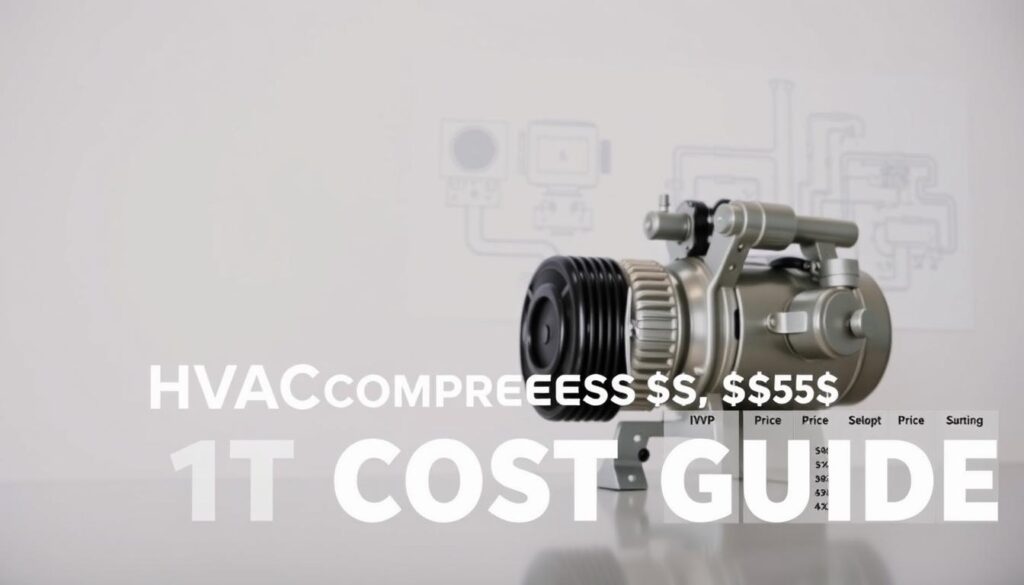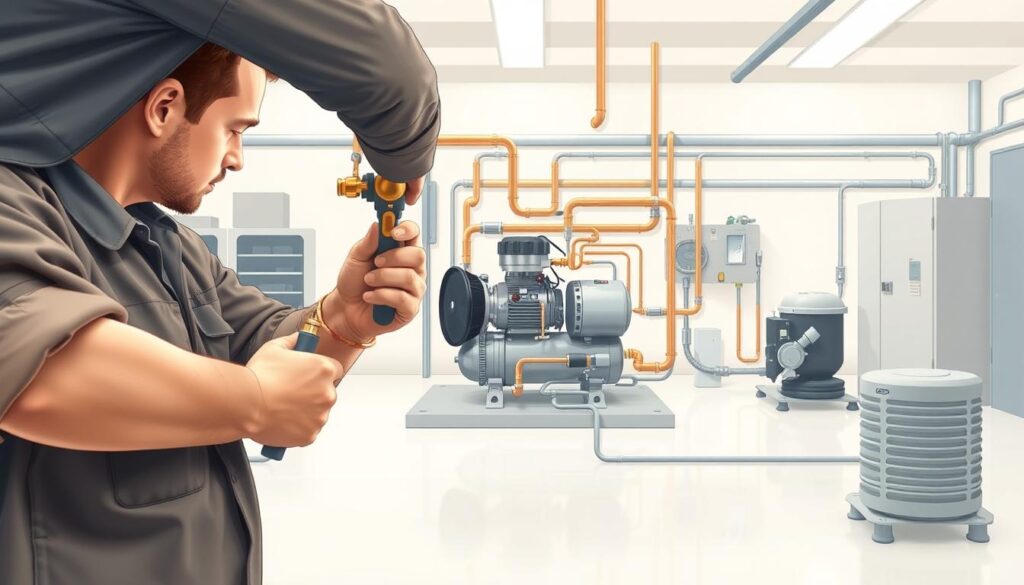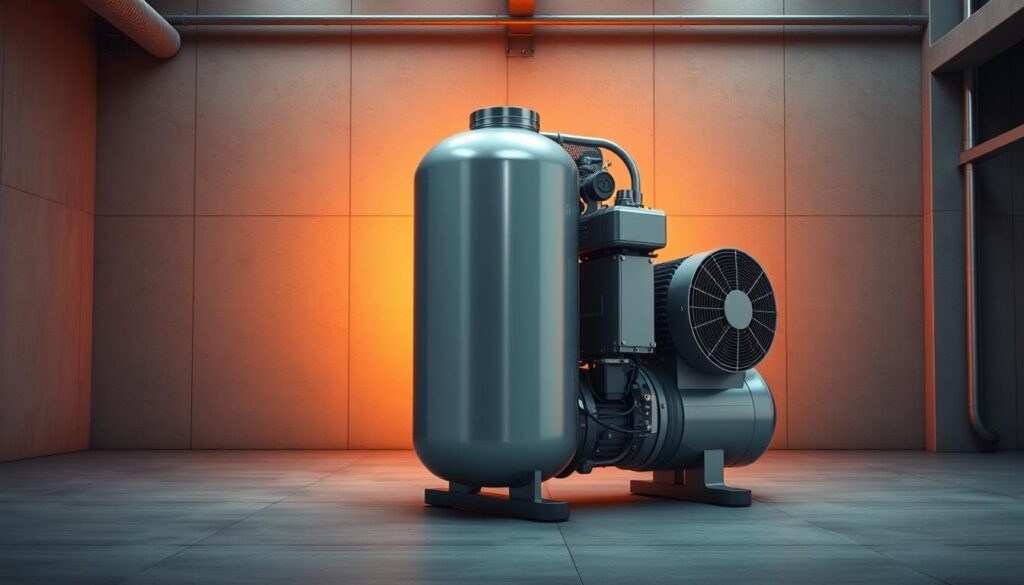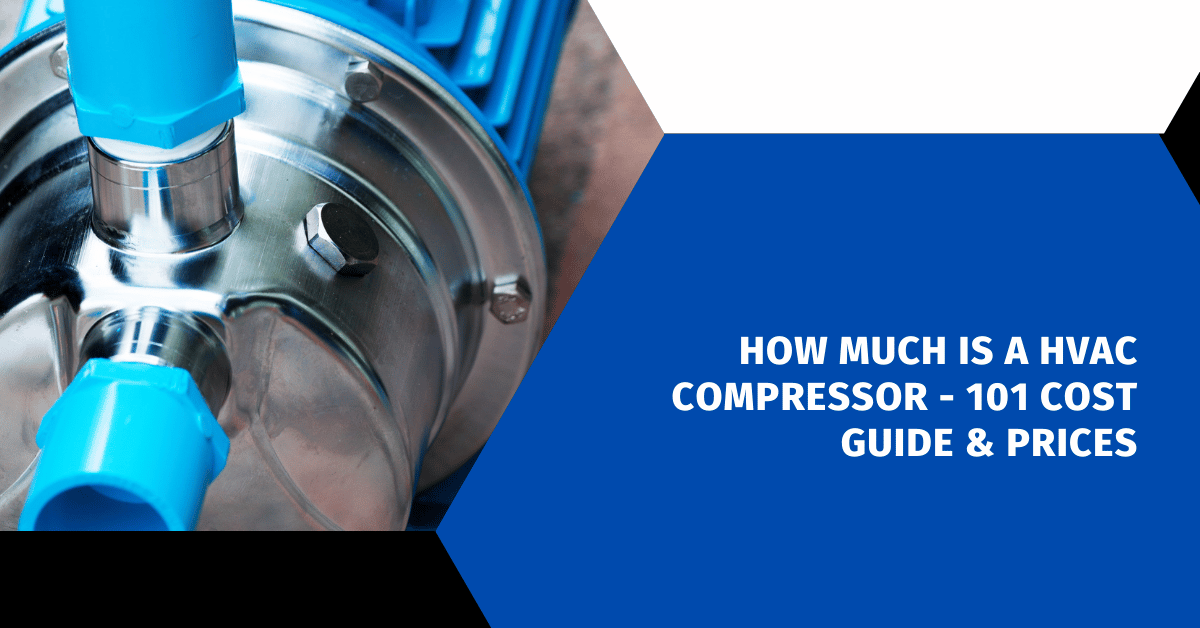Affiliate Disclosure
HVAC Guide Guys is a participant in the Amazon Services LLC Associates Program, an affiliate advertising program designed to provide a means for sites to earn advertising fees by advertising and linking to Amazon.
How Much Is A HVAC Compressor? Are you curious about the cost of an HVAC compressor? Knowing the true cost can be a big help for homeowners and businesses. It’s key for planning your budget and making smart choices about cooling systems.

HVAC replacement costs can vary a lot. A single unit might cost up to $6,000, while a full system replacement could be $15,000. The cost of a hvac compressor depends on several factors that affect your total investment.
This guide will cover everything you need to know about HVAC compressor prices. We’ll look at basic costs and the more complex installation factors. Whether you’re a homeowner or a business owner, you’ll find useful information here.
Key Takeaways
- HVAC compressor costs vary widely based on system complexity
- Replacement expenses can range from $1,500 to $6,000
- Factors like brand, capacity, and installation impact total price
- Professional assessment is key for accurate cost estimation
- Regular maintenance can help prevent unexpected replacement costs
Table of Contents
Understanding HVAC Compressor Basics
Your HVAC system compressor is the heart of your air conditioning unit. It plays a key role in cooling your home efficiently. This vital component works tirelessly to transform refrigerant from a gas to a liquid. This process enables heat transfer and creates comfortable indoor temperatures.
Compressors come in various designs, each with unique characteristics. These differences impact ac compressor cost and performance. Understanding these differences can help you make informed decisions about your cooling system.
Types of HVAC Compressors
- Scroll Compressors: Quiet and efficient, ideal for residential use
- Reciprocating Compressors: Most common, affordable option
- Rotary Compressors: Compact and suitable for smaller spaces
- Screw Compressors: Typically used in large commercial systems
Role in Air Conditioning Systems
The HVAC system compressor acts as a critical pump. It circulates refrigerant through your cooling system. It compresses low-pressure refrigerant gas into a high-pressure, high-temperature state. This state then moves through the condenser to release heat.
Common Compressor Brands
| Brand | Reputation | Average Lifespan |
|---|---|---|
| Copeland | Highly Reliable | 10-15 years |
| Carrier | Industry Leader | 12-18 years |
| Trane | Premium Quality | 15-20 years |
Selecting the right compressor depends on your specific cooling needs, budget, and home configuration. An experienced HVAC professional can help you navigate these choices. They can find the most suitable solution for your ac compressor cost and performance requirements.
Explore Our HVAC Shop
Looking for top-rated HVAC tools, parts, and accessories? Visit our shop and find the perfect solution for your needs.
Visit the ShopHow Much Is A HVAC Compressor: Complete Price Breakdown
Understanding hvac compressor pricing can be tough for homeowners and property managers. The cost of a new HVAC compressor varies a lot. You can expect to spend between $1,200 and $2,800 for a residential replacement.
When looking at hvac compressor prices, you’ll see different costs based on certain features. Let’s look at the main pricing factors:
- Compressor type (scroll, reciprocating, variable-speed)
- Brand reputation
- Unit capacity
- Energy efficiency rating
To help you grasp hvac compressor pricing, we’ve put together a detailed comparison:
| Compressor Type | Price Range | Average Lifespan |
|---|---|---|
| Scroll Compressor | $1,500 – $2,500 | 10-15 years |
| Reciprocating Compressor | $1,200 – $2,000 | 8-12 years |
| Variable-Speed Compressor | $2,000 – $2,800 | 12-20 years |
Keep in mind, professional installation can add $500 to $1,500 to your total cost. Energy-efficient models might cost more at first but can save you money on bills later.
Pro tip: Always get multiple quotes and compare warranties when considering HVAC compressor replacement.
Factors Affecting Compressor Replacement Costs
When you think about replacing your HVAC compressor, knowing what affects the price is key. The cost of installing a new compressor includes many parts. These parts can change how much you’ll pay.
Several important things decide the final cost of replacing your compressor:
- Labor complexity and professional expertise
- Geographic location and regional pricing
- Specific system size and capacity requirements
- Current market rates for HVAC equipment
Labor Costs and Installation Fees
Getting a professional to install your new compressor is a big part of the cost. Technicians charge differently based on their skills and the system’s complexity. Labor costs usually make up 30-50% of the total cost.
“Professional installation ensures your HVAC system operates at peak efficiency and performance.” – HVAC Industry Expert
Geographic Location Impact
Where you live also affects the cost. Cities with higher costs of living have pricier HVAC services than rural areas. Local competition, demand, and the economy play a big role in prices.
System Size and Capacity Considerations
The size and capacity of your system also matter. Bigger systems need more expensive parts and take longer to install. Home systems are generally cheaper than commercial ones, which need more powerful compressors.
Knowing these factors helps you make smart choices about replacing your compressor. This way, you get a fair price and quality service.
Explore Our HVAC Shop
Looking for top-rated HVAC tools, parts, and accessories? Visit our shop and find the perfect solution for your needs.
Visit the ShopResidential vs Commercial HVAC Compressor Prices
When looking at HVAC compressors, it’s key to know the difference between home and business systems. Your choice depends on your needs, budget, and how you plan to use it.
Home HVAC compressors cost between affordable and mid-range. They’re made for smaller places like houses and apartments. They meet the cooling needs of most homes.
Business HVAC compressors are more expensive. They need advanced engineering and can handle big spaces like offices and warehouses. This is because they cool down larger areas.
- Residential HVAC compressor average cost: $1,500 – $3,500
- Commercial HVAC compressor average cost: $3,500 – $10,000
- Factors influencing price variations:
- System capacity
- Energy efficiency ratings
- Brand reputation
- Technological complexity
What you need will decide which compressor is best for you. Home compressors aim for comfort and efficiency. Business compressors focus on cooling big areas well.
“Investing in the right HVAC compressor means balancing initial costs with long-term performance and energy savings.” – HVAC Industry Expert
Getting advice from a pro can help you choose between home and business compressors. They’ll make sure you pick the right one for your cooling needs.
Signs Your HVAC Compressor Needs Replacement
Your HVAC system sends out clear signals about its health. Spotting these signs can prevent expensive repairs and sudden breakdowns. Knowing when to act on your compressor’s needs is key to keeping your home comfy and avoiding high ac compressor costs.
Compressors are the core of your air conditioning. When they fail, your cooling drops. Look out for these important warning signs:
- Weak or inconsistent airflow from vents
- Unusual grinding or squealing noises
- Blowing warm air instead of cool
- Unexpected moisture around the unit
- Unpleasant odors from ductwork
Common Compressor Failure Symptoms
Some symptoms hint at a failing compressor. Frequent cycling means internal issues. Strange sounds like clicking, rattling, or humming point to mechanical problems needing a pro’s look.
Diagnostic Process
HVAC pros use special tools to check your compressor. They examine electrical connections, refrigerant levels, and mechanical parts. A detailed check helps figure out if fixing or replacing is better for your wallet.
When to Replace vs Repair
Think about replacing if your compressor is:
- Over 10-15 years old
- Requiring frequent repairs
- Operating with significantly reduced efficiency
- Experiencing major mechanical failures
Swapping out an old compressor can save you money. It boosts energy efficiency and cuts down on repair costs.
Explore Our HVAC Shop
Looking for top-rated HVAC tools, parts, and accessories? Visit our shop and find the perfect solution for your needs.
Visit the ShopAverage Installation Timeline and Process

When you plan to replace your hvac system compressor, knowing the timeline is key. A full hvac compressor installation usually takes 4-8 hours. This depends on your system and home setup.
The installation process has several important steps:
- Initial system assessment and equipment evaluation
- Removing the old hvac system compressor
- Preparing the installation site
- Installing new compressor components
- Electrical and refrigerant line connections
- System testing and calibration
Your HVAC technician will do a detailed diagnostic check. Professional installation is vital for the best system performance and life.
Things that might make the installation take longer include:
- Complex system setups
- Need for ductwork changes
- Electrical connection upgrades
- Dealing with structural issues
Before you book your hvac compressor installation, ask your certified HVAC pro for a detailed timeline. This will help you understand what your home needs.
Warranty Coverage and Protection Plans
Protecting your HVAC compressor starts with knowing your warranty. When you buy a new HVAC system, the maker usually offers a warranty. This can help with unexpected costs.
Most warranties cover certain parts for a set time. Knowing what your warranty includes can save you a lot when you need a compressor replaced.
Manufacturer Warranty Essentials
- Standard coverage is usually 5-10 years
- It covers defects in materials and workmanship
- It might include parts for compressor failures
- It’s only valid if installed by a pro
Extended Coverage Options
There are also extra protection plans you can buy. These extended warranties give you more peace of mind. They can also help with repair costs.
- Comprehensive plans cover labor and parts
- They offer flexible terms from 1-5 extra years
- They can save you money on big repairs
- Some include yearly maintenance checks
Pro tip: Always read the fine print and understand exactly what your warranty covers before making a decision.
Remember, a good warranty can be your financial safety net against unexpected HVAC system failures.
Explore Our HVAC Shop
Looking for top-rated HVAC tools, parts, and accessories? Visit our shop and find the perfect solution for your needs.
Visit the ShopEnergy Efficiency and Cost Savings

Choosing an energy-efficient hvac system compressor can cut down your energy costs over time. Today’s compressors save a lot thanks to new tech and smart designs. When you look at the cost of an ac compressor, remember the energy savings of high-efficiency models.
Important efficiency numbers to check are:
- SEER (Seasonal Energy Efficiency Ratio)
- AFUE (Annual Fuel Utilization Efficiency)
- ENERGY STAR® certification
An ENERGY STAR® certified compressor can cut energy use by up to 15%. This means big savings on your monthly bills. Better efficiency means your system works better, lasts longer, and needs less repair.
When you think about ac compressor cost, don’t just look at the upfront price. Think about the long-term money you’ll save:
- Less money on energy each month
- Lower maintenance costs
- Possible tax breaks for energy-saving upgrades
Pro tip: Keep up with regular maintenance to keep your system running at its best and save more on energy.
Choosing the Right HVAC Professional
Finding a skilled HVAC technician is key for your system’s performance and reliability. The right person can greatly improve your HVAC system’s quality and lifespan.
When looking for an HVAC contractor, focus on important factors. These help you find top-quality professionals from the rest.
Essential Certification Requirements
Professional HVAC technicians need certain credentials to show their skills:
- EPA Section 608 Certification for handling refrigerants
- NATE (North American Technician Excellence) certification
- State-specific HVAC licensing
- Current insurance and bonding
Critical Questions to Ask
Before hiring an HVAC professional, ask these key questions:
- Are you licensed and insured in this state?
- What specific experience do you have with my HVAC system?
- Can you provide references from recent hvac compressor installation jobs?
- What warranties do you offer on parts and labor?
*Pro Tip*: Always verify a contractor’s credentials and check online reviews before making a final decision.
Choosing a qualified professional wisely can save you money and prevent HVAC system problems later.
Explore Our HVAC Shop
Looking for top-rated HVAC tools, parts, and accessories? Visit our shop and find the perfect solution for your needs.
Visit the ShopMaintenance Tips to Extend Compressor Life
Keeping your HVAC system compressor in good shape is key. Regular maintenance can make your compressor last longer and save you money on repairs.
Begin with a routine that includes important steps:
- Clean or replace air filters every 30-90 days
- Keep outdoor unit clear of debris and vegetation
- Schedule professional HVAC system compressor inspections annually
- Monitor refrigerant levels
- Check electrical connections periodically
Knowing the signs of trouble can help you fix issues early. Listen for odd sounds, notice if cooling isn’t right, and watch your energy bills.
| Maintenance Task | Frequency | Benefit |
|---|---|---|
| Air Filter Replacement | Every 30-90 days | Prevents system strain |
| Professional Inspection | Annually | Identifies possible problems |
| Outdoor Unit Cleaning | Seasonally | Ensures good airflow |
For complex repairs, always call a pro. Homeowners can handle simple tasks, but experts are needed for detailed checks.
Invest in preventative maintenance to save money and extend your HVAC system’s lifespan.
Every maintenance step helps your system work better. Being proactive means fewer surprises and less need for expensive fixes.
Conclusion
Figuring out how much a HVAC compressor costs can be tricky. But, with the right info, you can choose wisely for your home’s cooling. A good compressor saves money in the long run by being energy-efficient.
The price of a HVAC compressor depends on several things. These include the system’s size, the brand, and how hard it is to install. Think about energy ratings, upkeep needs, and how it can save you money on bills. A newer, efficient system can cut down your energy costs a lot.
Getting a pro to install and maintain your compressor is key. They can make sure it lasts longer and works better. Talking to certified HVAC experts, knowing about warranties, and fixing problems early will keep your system running smoothly.
Your HVAC system is a vital part of your home. Choosing and caring for your compressor wisely can make your home more comfortable. It also saves energy and helps the environment. Make a smart choice, and your HVAC system will be reliable for many years.

